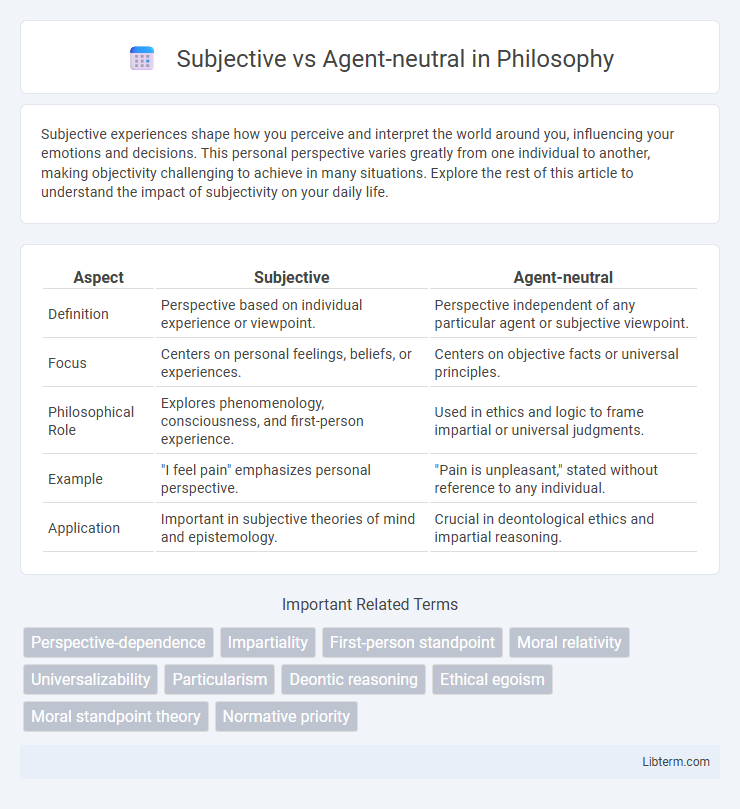Subjective experiences shape how you perceive and interpret the world around you, influencing your emotions and decisions. This personal perspective varies greatly from one individual to another, making objectivity challenging to achieve in many situations. Explore the rest of this article to understand the impact of subjectivity on your daily life.
Table of Comparison
| Aspect | Subjective | Agent-neutral |
|---|---|---|
| Definition | Perspective based on individual experience or viewpoint. | Perspective independent of any particular agent or subjective viewpoint. |
| Focus | Centers on personal feelings, beliefs, or experiences. | Centers on objective facts or universal principles. |
| Philosophical Role | Explores phenomenology, consciousness, and first-person experience. | Used in ethics and logic to frame impartial or universal judgments. |
| Example | "I feel pain" emphasizes personal perspective. | "Pain is unpleasant," stated without reference to any individual. |
| Application | Important in subjective theories of mind and epistemology. | Crucial in deontological ethics and impartial reasoning. |
Understanding Subjective and Agent-Neutral Perspectives
Subjective perspectives emphasize individual experiences and personal biases, highlighting how personal beliefs shape interpretations and decisions. Agent-neutral perspectives focus on objective analysis, detaching from specific agents to evaluate situations impartially based on universal standards. Mastery of both approaches enhances critical thinking by balancing personal insights with unbiased assessment, fostering comprehensive understanding across diverse contexts.
Defining Subjective Morality
Subjective morality defines ethical values based on individual or cultural perspectives, emphasizing personal beliefs and experiences as the foundation for right and wrong. Unlike agent-neutral morality, which applies universal standards regardless of the individual's viewpoint, subjective morality varies according to specific agents' intentions and contexts. This approach highlights the fluidity of moral judgments shaped by subjective factors rather than objective, impersonal principles.
The Core of Agent-Neutral Ethics
The core of agent-neutral ethics centers on principles and values that apply universally, regardless of an individual's specific perspective or situation. Unlike subjective ethics, which are influenced by personal experiences and biases, agent-neutral ethics seek objective moral standards that guide actions for everyone equally. This framework emphasizes impartiality and fairness, ensuring ethical decisions prioritize the collective good over personal interests.
Key Differences Between Subjective and Agent-Neutral Approaches
Subjective approaches emphasize individual perspectives and personal experiences, often incorporating biases and emotions that influence interpretation and decision-making. Agent-neutral approaches prioritize impartiality by focusing on outcomes and principles regardless of who is involved, ensuring fairness and consistency across different agents. Key differences include the role of personal context in subjective methods versus the objective, universal applicability central to agent-neutral frameworks.
Historical Development of Subjective and Agent-Neutral Theories
Subjective theories of action trace back to early philosophical thought emphasizing intentionality and personal motives, notably in the works of Aristotle and later phenomenologists like Husserl, highlighting the first-person perspective in understanding human agency. Agent-neutral theories emerged more prominently in modern analytic philosophy, driven by debates in ethics and action theory, aiming to describe actions without privileging the agent's subjective viewpoint, as seen in the writings of philosophers like Anscombe and Davidson. The historical development of these theories reflects a shift from interpreting actions through internal experiences to explaining actions via external, objective criteria for broader normative and explanatory utility.
Philosophical Arguments for Subjectivity
Philosophical arguments for subjectivity emphasize the essential role of individual conscious experience in shaping reality, arguing that knowledge and meaning are inherently tied to personal perspectives and mental states. Subjective reasoning highlights the irreducibility of first-person viewpoints, asserting that objective or agent-neutral accounts fail to capture the qualitative aspects of consciousness known as qualia. This viewpoint challenges physicalist and objectivist frameworks by positing that subjectivity is fundamental to understanding phenomena like intentionality, emotions, and perception.
Philosophical Arguments for Agent-Neutrality
Agent-neutrality in ethics posits moral considerations independent of an individual's personal perspective, emphasizing impartiality and universalizability. Philosophical arguments for agent-neutrality highlight its alignment with principles of fairness and the avoidance of bias, stressing that moral reasons should apply equally to all agents regardless of their specific interests. This contrasts with subjective ethics, which grounds moral judgments in individual motives or perspectives, potentially leading to partiality and inconsistency in ethical evaluation.
Real-World Applications in Ethics
Subjective ethics emphasizes individual perspectives and personal values in moral decision-making, often shaping diverse viewpoints in healthcare choices and cultural practices. Agent-neutral ethics prioritizes impartial criteria and universal principles, influencing policies in global justice and environmental regulation. Real-world applications highlight subjective ethics in patient-centered care, while agent-neutral frameworks guide equitable resource distribution and legal standards.
Criticisms of Subjective and Agent-Neutral Frameworks
Subjective frameworks in ethics often face criticism for their reliance on individual perspectives, which can lead to inconsistent moral judgments lacking universal applicability. Agent-neutral frameworks are challenged for potentially ignoring the significance of personal intentions and context, resulting in overly abstract principles that may not align with practical decision-making. Both approaches struggle to balance universal moral standards with the nuanced realities of human agency and situational ethics.
Balancing Subjective and Agent-Neutral Considerations
Balancing subjective and agent-neutral considerations requires integrating individual perspectives with impartial, universal principles to ensure fair decision-making. Subjective viewpoints reflect personal experiences and values, while agent-neutral approaches emphasize impartiality and overall well-being, providing a framework for ethical evaluation. Achieving equilibrium between these dimensions supports nuanced judgments that respect individual context without sacrificing objective standards.
Subjective Infographic

 libterm.com
libterm.com